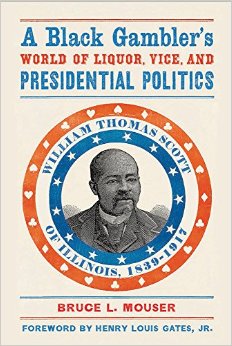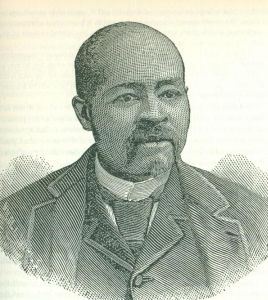
Good Morning POU!
This week, we’ll feature the stories of little known African-Americans from the past that lived extraordinary, often dangerous lives – the greatest hustlers of the day. All are worthy of a big budget biographical film, but we know how Hollywood works. However, you won’t find more entertaining, amazing life stories!
Gambler and Presidential Candidate: William Thomas Scott

WILLIAM THOMAS SCOTT was an entrepreneur and political activist from East Saint Louis and Cairo, Illinois, who in 1904 briefly became the first African American nominated by a national party for president of the United States. He is alleged to have been one of the wealthiest African Americans in Illinois at the peak of his career.
The author of a 2011 biography on Scott’s life, Bruce L. Mouser, is a retired professor of history at the University of Wisconsin–La Crosse. He first became aware of Scott’s story while he was writing a different book about another early African American journalist and politician, George Edwin Taylor.
“I had initially thought that George Edwin Taylor was the first African American nominated to run for president of the United States. Taylor was indeed the first to get on the ballot, but as I found out in my research, William Thomas Scott was actually the first nominee of the National Negro Liberty Party, but he was soon replaced by Taylor,” Mouser says. “Taylor was better educated and more socially acceptable as a candidate. William Scott’s past arrests for vice trades wouldn’t play well in the national political arena.”
As Mouser discovered, Scott was a charismatic hustler who built his fortune in Illinois in the Cairo–East Saint Louis area through illegal liquor sales, gambling, and operating houses of ill repute.

He also branched into legal businesses including hotels, saloons, and real estate. Eventually he became the publisher and editor of what may have been America’s first African American daily newspaper, the Cairo Gazette, and became active in politics.
“The post-Civil War era in the United States was a time of promise for African Americans, but in the late nineteenth and earlier twentieth centuries they lost ground with the rise of Jim Crow laws and scientific racism,” says the book’s author, Bruce Mouser. “William Scott struggled into the twentieth century to retain the progress made by African Americans.”

Scott was an outspoken advocate for equal rights. Like many in his era, he believed in political patronage and frequently led rebellions against political bosses who failed to deliver jobs and reforms in exchange for votes.
“Scott refused to be complicit in backing politicians who took him and the broader base of first-generation black voters for dupes,” notes Henry Louis Gates, Jr. “He saw the political game for what it was: a game of power.”
When nearly all voting Blacks were Republicans—the party of Abraham Lincoln—William Scott broke away to become a Democrat. In his journalism and speeches he encouraged Blacks to look beyond Lincoln’s party and cast their votes in support of their own economic interests and civil rights. Scott became disillusioned with Democrats of the era as well and helped build the National Negro Liberty Party (NNLP) to forward economic, political, and legal rights for his race. The National Negro Liberty Party was active at the state and national levels between 1904 and 1910. In 1904, the major platform initiative was government pensions for ex-slaves.
He served in various high offices in the Bureau until 1915. Scott also was president and founder of the National Negro Anti-Expansion, Anti-Imperialist, Anti-Trust and Anti-Lynch League. Scott by this time was known nationally as a superb organizer, a gifted speaker, and a person of wealth.
His nomination by the political party he built however, led to a scandal, and his name was removed from the party’s ticket when he was arrested for failing to pay a fine for having operated a “disorderly house.”
Although arrested numerous times on charges related to bootleg liquor sales, gambling, and prostitution, Scott had remained a popular public speaker, journalist, and political power broker in Illinois. But the hustling that had brought him business success proved his undoing as a national political figure. Although he was the NNLP’s initial presidential nominee in 1904, revelations about his scandalous past forced him to step aside for another candidate.
William Thomas Scott died on January 23, 1917, in Springfield, Illinois.
